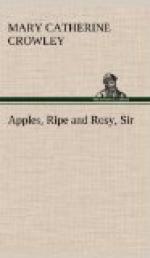Mrs. Clayton had hardly finished speaking, when a long ray of yellow light fell upon the tablecloth.
“There! the sun’s out now, anyway! Crickey, I’m so glad!” exclaimed Larry.
“The clouds were only blown up by the wind,” said his father. “I do not think we shall have rain to-day.”
“Mother, may I put on a white dress and go to buy my May wreath?” asked Abby.
“The air is too cold for you to change your warm gown for a summer one, dear,” returned Mrs. Clayton. “You may get the wreath, though; but be sure that you wear it over your hat.”
Abby seemed to think it was now her turn to grumble.
“Oh, dear!” she murmured. “All the girls wear white dresses, and go without hats on May Day. I don’t see why I can’t!”
Her complaint made no impression, however; so she flounced out of the room.
“My mother is the most exaggerating person!” exclaimed the little girl, as she prepared for her shopping excursion. She meant aggravating; but, like most people who attempt to use large words the meaning of which they do not understand, she made droll mistakes sometimes.
Abby had fifteen cents, which her grandma had given her the day before.
“I’ll hurry down to the Little Women’s before the best wreaths are gone,” she said to herself.
The place was a fancy store, kept by two prim but pleasant spinster sisters. Besides newspapers, stationery, thread and needles, and so forth, they kept a stock of toys, candies, and pickled limes, which insured them a run of custom among the young folk, who always spoke of them as the Little Women. Not to disappoint the confidence placed in them by their youthful patrons, they had secured an excellent assortment of the crowns of tissue-paper flowers which, in those days, every little girl considered essential to the proper observance of May Day.
Abby selected one which she and the Little Women made up their minds was the prettiest. It usually took both of the Little Women to sell a thing. If one showed it, the other descanted upon its merits, or wrapped it up in paper when the bargain was completed. Neither of them appeared to transact any business, even to the disposal of “a pickle lime” (as the children say), quite on her own responsibility.
After Abby had fully discussed the matter with them, therefore, she bought her wreath. It was made of handsome white tissue-paper roses, with green tissue-paper leaves, and had two long streamers. There was another of pink roses, which she thought would be just the thing for Larry to buy with the fifteen cents which he had received also. But Larry had said:
“Pshaw! I wouldn’t wear a wreath!” Abby didn’t see why, because some boys wore them.
On the way home she met a number of her playmates. Several of them shivered in white dresses, and all were bareheaded except for their paper wreaths. Not one of the wreaths was so fine as Abby’s, however. But, then, few little girls had fifteen cents to expend upon one. Abby perceived at a glance that most of those worn by her companions were of the ten-cent variety. The Little Women had them for eight; and even five copper pennies would buy a very good one, although the roses of the five-cent kind were pronounced by those most interested to be “little bits of things.”




